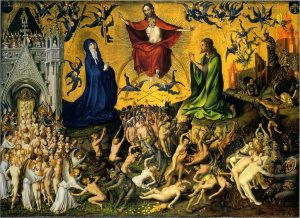Thoughts on Sunday’s Lessons for Nov. 22, 2020
First Reading (Track One): Ezekiel 34:11-16, 20-24
The long Pentecost season and the year of Matthew’s Gospel come to an end on Sunday with both Lectionary tracks combined in one reading. Next week we begin Advent and a year with the Gospel according to Mark.

Weltgericht (Last Judgement, c.1435), centerpiece of a tempera on oak polyptych by Master Stefan Lochner (c.1410 -1451). Wallraf-Richartz-Museum, Cologne, Germany. (Click image to enlarge.)
This Lectionary year concludes with a festival day (a relatively recent addition to the calendar) known as Christ the King or the Reign of Christ. For many of us, the idea of kingship and royalty may sound like an echo of older times well left behind. But Sunday’s readings show us Jesus Christ as a different kind of king: not a traditional patriarch but a loving shepherd. The first reading joins both Lectionary tracks as we hear the prophet Ezekiel speak to Israel in exile. Using the metaphor of a kingly shepherd feeding and caring for the sheep, the prophet writes that God will judge the fat sheep and the lean, protecting the lost and weak sheep while destroying the powerful sheep who ravaged them.
Psalm (Track One): Psalm 100
Our Track One Psalm, a joyous hymn, is a traditional call to worship: It urges all the people to come to God with gladness and song, grateful for God’s mercy and kindness. The Psalm is likely familiar to Episcopalians who know it as the Jubilate in Morning Prayer, a reading that portrays the people as the protected sheep of God’s pasture, joyously singing thanksgiving and praise.
Psalm (Track Two): Psalm 95:1-7a
The words of Sunday’s Track Two Psalm likely sound familiar too: This joyous hymn is read or chanted as the Venite in Morning Prayer. These verses sing out unalloyed worship and praise to the creator and protector of all things. In harmony with today’s other readings, it celebrates God as both king of kings above all gods and loving shepherd who cares for us, the protected sheep of God’s hand.
Second Reading: Ephesians 1:15-23
After spending a few weeks with 1 Thessalonians, perhaps the earliest of Paul’s letters, we now conclude the season with a passage from the Letter to the Ephesians. This later epistle was most likely written by a first century Christian a generation after Paul’s death. It may reflect the early church’s growing understanding of Christ and its recognition that Jesus might not return as soon as early Christians had hoped: The author declares that God the creator has placed the resurrected Jesus at God’s right hand and given him authority over all things in heaven and in the church, his body on earth.
Gospel: Matthew 25:31-46
This familiar reading, beloved by Christians who advocate for the social gospel and a theology of liberation for the poor, concludes Matthew’s series of parables on the kingdom of heaven. The next page of Matthew’s Gospel turns directly to the Last Supper and the Passion. In this reading Matthew tells us that recognizing the face of Jesus in the face of a hungry, thirsty, homeless person, sick and naked and oppressed, is the way to make God’s Kingdom happen, even if it is difficult. Then Matthew warns that those who fail to see Jesus in their hungry neighbor will earn a place in the outer darkness that also awaited the slave with the single talent and the foolish bridesmaids. This is a hard teaching, telling us that we ignore Jesus’ call to serve only at our peril. But remember, too, that the mighty king who judges us is also the loving shepherd who shows us how to love one another.
